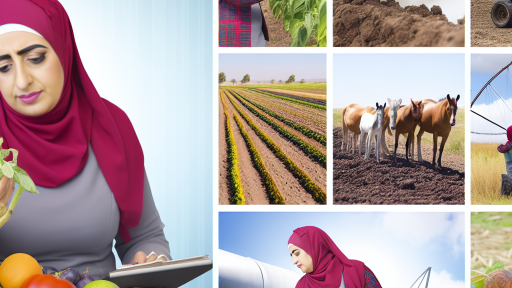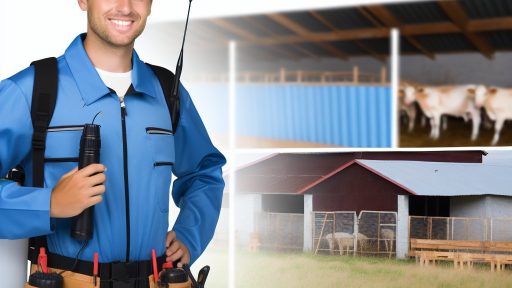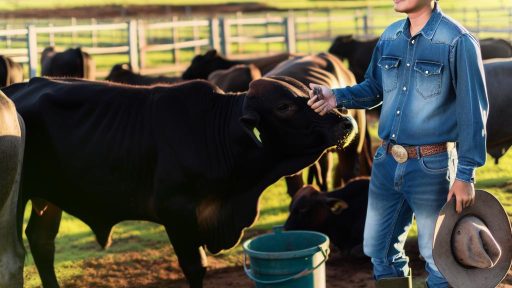Introduction to Sustainable Livestock Waste Management
Understanding Livestock Waste
Livestock waste includes manure, urine, and bedding materials.
Effective management is crucial for maintaining farm health.
This waste can pollute soil and water if not handled properly.
Moreover, unmanaged waste contributes to greenhouse gas emissions.
The Importance of Sustainable Solutions
Sustainable livestock waste management helps protect the environment.
It reduces the negative effects of waste on ecosystems.
Furthermore, sustainable practices can enhance farm productivity.
Farmers can turn waste into valuable resources with the right approach.
Benefits of Sustainable Waste Management
Effective waste management can lead to healthier livestock.
It improves soil quality by adding nutrients back into the ground.
Farmers can also save on fertilizers by recycling manure.
Additionally, proper management can mitigate odor issues.
Finally, sustainable practices promote compliance with regulations.
Implementing Sustainable Practices
Farmers can adopt various strategies for waste management.
Composting is a popular method that transforms waste into organic matter.
Transform Your Agribusiness
Unlock your farm's potential with expert advice tailored to your needs. Get actionable steps that drive real results.
Get StartedAdditionally, anaerobic digestion converts waste into biogas.
Farmers should evaluate their specific needs to find the best solution.
Collaboration with local experts can enhance implementation success.
Benefits of Sustainable Waste Solutions for Farms
Environmental Impact
Sustainable waste solutions enhance environmental health on farms.
They reduce pollution and greenhouse gas emissions significantly.
Moreover, these practices contribute to soil fertility and biodiversity.
Economic Advantages
Implementing sustainable waste management can lower operational costs.
Farmers save money through reduced waste disposal fees.
Additionally, organic waste can be transformed into valuable compost.
This compost improves crop yields, offering economic returns.
Regulatory Compliance
Adopting sustainable practices helps farmers comply with environmental regulations.
This minimizes the risk of fines and legal issues.
Consequently, farms can operate more smoothly and efficiently.
Community and Social Benefits
Sustainable waste solutions foster better relationships within the community.
They demonstrate a farm’s commitment to environmental stewardship.
Moreover, these practices can enhance the farm’s reputation among consumers.
Long-term Viability
These solutions ensure the long-term sustainability of farming operations.
They help preserve resources for future generations.
In turn, this leads to a more resilient agricultural sector.
Composting as an Effective Waste Management Strategy
Understanding Composting
Composting transforms organic matter into nutrient-rich soil.
This process reduces waste and enhances soil health.
It utilizes various materials, including livestock manure.
Composting incorporates carbon-rich brown materials and nitrogen-rich greens.
Proper balance between these materials is crucial for success.
Showcase Your Farming Business
Publish your professional farming services profile on our blog for a one-time fee of $200 and reach a dedicated audience of farmers and agribusiness owners.
Publish Your ProfileBenefits of Composting for Farms
Composting offers numerous benefits for livestock farms.
First, it helps reduce the volume of waste on farms.
This reduction lowers disposal costs and minimizes environmental impact.
Additionally, compost improves soil fertility and structure.
It promotes better water retention and encourages beneficial organisms.
How to Start Composting on Your Farm
Begin by selecting a suitable location for your compost pile.
Choose a spot that is well-drained and accessible.
Next, gather materials for composting.
- Collect livestock manure.
- Add bedding materials like straw or wood shavings.
- Incorporate kitchen scraps and yard waste.
Layer these materials to build a balanced compost pile.
Regularly turn the pile to aerate and accelerate decomposition.
Monitoring the Composting Process
Keep an eye on moisture levels in your compost.
The pile should be damp but not waterlogged.
Monitor temperatures as the compost breaks down.
Higher temperatures indicate active decomposition.
Allow the compost to mature for several months before use.
Utilizing Finished Compost
Once the compost is ready, incorporate it into your fields.
This nutrient-rich amendment will enhance crop yields.
Furthermore, it reduces the need for chemical fertilizers.
Farmers also benefit from improved soil health over time.
Challenges and Considerations
Despite its benefits, composting requires careful management.
Pests and odors may arise if not properly handled.
To mitigate these issues, maintain the right balance of materials.
Regular turning of the pile also minimizes odor and prevents pests.
Learn More: Biosecurity Measures For Livestock Housing
Anaerobic Digestion Processes and Applications
Overview of Anaerobic Digestion
Anaerobic digestion is a biological process that occurs without oxygen.
This process breaks down organic matter, such as livestock waste.
Bacteria facilitate the decomposition, producing biogas as a byproduct.
Biogas mostly consists of methane, a valuable energy source.
Furthermore, the process produces digestate, which can improve soil quality.
Key Stages in Anaerobic Digestion
Anaerobic digestion involves several key stages.
The first stage is hydrolysis, where complex organic compounds break down.
Next comes acidogenesis, during which fermentation occurs.
This leads to acetogenesis, converting fatty acids into acetic acid.
Finally, in methanogenesis, methanogenic bacteria produce methane gas.
Applications of Anaerobic Digestion on Farms
Anaerobic digestion has numerous applications in livestock farming.
First, it provides an effective waste management solution.
By processing manure, farmers minimize environmental pollution.
Additionally, they can generate renewable energy through biogas production.
This energy can power farm operations or be used for heating.
Benefits of Implementing Anaerobic Digestion
Implementing anaerobic digestion offers many benefits to farms.
Showcase Your Farming Business
Publish your professional farming services profile on our blog for a one-time fee of $200 and reach a dedicated audience of farmers and agribusiness owners.
Publish Your ProfileIt reduces odors, making farms more pleasant environments.
Moreover, it decreases greenhouse gas emissions significantly.
The process also produces high-quality digestate as fertilizer.
This fertilizer enriches soil, enhancing crop yields sustainably.
Challenges and Considerations
While anaerobic digestion is beneficial, it also presents challenges.
Initial setup costs can be high for some farms.
Furthermore, adequate management is essential for effective operation.
Farmers must consider the scale of their operations.
Ultimately, planning and investment can lead to long-term sustainability.
Discover More: Managing Space In Multi-Species Livestock Facilities
Utilizing Waste for Renewable Energy Production
Overview of Renewable Energy from Livestock Waste
Livestock farms produce significant amounts of waste daily.
This waste can be harnessed to generate renewable energy.
Biomass energy is one of the most effective solutions.
Farmers can use anaerobic digestion to convert waste into methane.
This method minimizes environmental impacts while providing energy.
Methods of Energy Production
Several methods exist to convert livestock waste into energy.
Biogas production through anaerobic digestion is popular.
This process involves microorganisms breaking down organic matter in absence of oxygen.
Another method is using solid waste for combustion.
This generates heat and electricity efficiently.
Benefits of Biogas
Biogas offers numerous advantages for farms.
It reduces greenhouse gas emissions significantly.
Farms that capture methane can lower their carbon footprint.
Additionally, biogas can replace fossil fuels in heating and transport.
Farmers can also benefit from a reduction in waste disposal costs.
Implementing Biogas Systems
Farmers should consider specific steps to implement biogas systems.
First, assess the type and amount of waste produced.
Next, select appropriate technology for waste management.
Engaging with experienced contractors can ensure successful installation.
Regular maintenance will maximize system efficiency and output.
Potential Challenges
Though beneficial, challenges exist in implementing these systems.
The initial investment for biogas systems can be considerable.
Moreover, technical knowledge is essential for effective operation.
Farmers need training and support from local organizations.
Addressing these challenges is crucial for successful adoption.
The Future of Renewable Energy on Farms
As technology improves, livestock waste energy solutions will expand.
Farmers will increasingly adopt these practices to save costs.
Government incentives may accelerate this transition.
Ultimately, utilizing livestock waste can lead to sustainable farming practices.
Renewable energy from waste holds vast potential for the agricultural industry.
Showcase Your Farming Business
Publish your professional farming services profile on our blog for a one-time fee of $200 and reach a dedicated audience of farmers and agribusiness owners.
Publish Your ProfileFind Out More: Essential Tips for Handling Livestock on Farms
Integrating Livestock Waste into Crop Production Systems
The Role of Livestock Waste
Livestock waste serves as a rich source of nutrients for crops.
It contributes essential elements like nitrogen, phosphorus, and potassium.
By properly managing this waste, farms can enhance soil fertility.
This integration supports sustainable agricultural practices.
Benefits of Utilizing Livestock Waste
Utilizing livestock waste reduces the need for synthetic fertilizers.
This practice lowers production costs over time.
Moreover, it helps mitigate environmental pollution.
A healthier soil ecosystem leads to better crop yields.
Effective Application Techniques
Composting is an effective way to process livestock waste.
This method stabilizes nutrients and reduces pathogens.
Farmers can apply compost directly to fields before planting.
Alternatively, liquid manure can be injected into the soil.
This method reduces odor and nutrient runoff.
Integrating Crop Rotation with Waste Management
Crop rotation enhances the benefits of livestock waste.
Different crops have varied nutrient needs, minimizing depletion.
For instance, legumes can use nitrogen from livestock waste.
And in return, they enrich soil for subsequent crops.
Monitoring Soil Health
Regular soil testing is crucial when integrating livestock waste.
This practice helps identify nutrient levels and pH balance.
Farmers can adjust waste application based on test results.
The goal is to maintain optimal soil conditions for growth.
Community and Educational Initiatives
Collaboration with local agricultural organizations enhances practices.
Workshops and training programs can inform farmers on techniques.
Sharing success stories fosters a spirit of innovation.
Gain More Insights: Preventing Common Diseases in Beef Cattle

Challenges and Barriers to Implementing Sustainable Solutions
Understanding Current Limitations
Sustainable livestock waste solutions face several limitations in adoption.
Many farmers lack access to the necessary technology.
Additionally, financial constraints hinder investment in innovative practices.
Furthermore, regulatory barriers often complicate compliance with sustainable standards.
Perceptions and Misconceptions
Some producers believe that sustainability is too costly to implement.
This perception can discourage investment in eco-friendly practices.
Moreover, misconceptions about the effectiveness of sustainable solutions persist.
Many farmers require education to shift their viewpoints on waste management.
Knowledge and Skill Gaps
A significant barrier is the lack of knowledge among farmers.
Many lack training in new waste management technologies.
Thus, educational programs play a crucial role in addressing this issue.
Moreover, outreach initiatives can improve awareness and skills.
Market Pressures and Competition
Market dynamics also influence farmers’ choices regarding sustainability.
Competitive pressures can lead to prioritizing immediate profits over long-term practices.
Showcase Your Farming Business
Publish your professional farming services profile on our blog for a one-time fee of $200 and reach a dedicated audience of farmers and agribusiness owners.
Publish Your ProfileThis short-sightedness can impede the adoption of sustainable methods.
Therefore, farmers need incentives to embrace eco-friendly approaches.
Infrastructure Challenges
The existing infrastructure often does not support sustainable waste management.
Many farms lack adequate facilities for processing waste effectively.
This limitation makes it challenging to adopt new technologies.
Improving infrastructure can enhance the viability of sustainable solutions.
Case Studies of Successful Sustainable Waste Practices in Farms
Holistic Management Practices
One successful approach comes from Green Meadows Farm in Wisconsin.
They implemented holistic management techniques to reduce waste.
The farm utilizes rotational grazing to enhance soil health.
This method has reduced the need for chemical fertilizers.
Moreover, their livestock waste replenishes nutrients efficiently.
Composting to Close the Loop
Sunny Hill Farm in Oregon exemplifies effective composting strategies.
They collect all livestock manure for composting.
This process transforms waste into valuable fertilizer.
As a result, Sunny Hill reduces airborne pollutants significantly.
Furthermore, they lessen the need for synthetic soil amendments.
Integration of Bio-Digesters
EcoFarm in California provides insights into bio-digester technology.
This innovative system captures methane from livestock waste.
They convert the gas into renewable energy for their operations.
This practice decreases greenhouse gas emissions dramatically.
Additionally, the by-product offers nutrient-rich digestate for crops.
Utilizing Manure as a Resource
Harvest Acres in Iowa practices manure management as a resource.
The farm integrates manure into their cropping systems effectively.
By using it as a natural fertilizer, they improve crop yields.
This approach saves on costs associated with commercial fertilizers.
Moreover, it minimizes nutrient runoff into nearby waterways.
Building Community Awareness
Lastly, Clear Creek Ranch in Colorado emphasizes community education.
They host workshops on sustainable waste management.
This initiative encourages local farmers to adopt similar practices.
The result is a collective effort toward improved environmental stewardship.
Consequently, the region witnesses an overall enhancement in biodiversity.
Future Trends in Sustainable Livestock Waste Management
Utilization of Advanced Technology
Farmers increasingly adopt technology for waste management.
Smart sensors monitor waste levels effectively.
These devices help optimize collection schedules.
Data analytics enhances decision-making for waste treatment.
Farmers can predict waste generation patterns accurately.
Biogas Production and Renewable Energy
Biogas production is becoming a popular solution.
Farmers convert livestock waste into renewable energy sources.
This energy can power farms and reduce utility costs.
Moreover, it lowers greenhouse gas emissions significantly.
Showcase Your Farming Business
Publish your professional farming services profile on our blog for a one-time fee of $200 and reach a dedicated audience of farmers and agribusiness owners.
Publish Your ProfileInvesting in biogas technology offers long-term sustainability.
Composting Practices
Composting is on the rise in sustainable farming.
Farmers turn waste into nutrient-rich compost for soil.
This process enhances soil fertility and structure.
Furthermore, it reduces landfill waste considerably.
Composting can also benefit local ecosystems.
Integration of Circular Economy Principles
The circular economy approach transforms waste into resources.
Farmers are finding new uses for livestock waste.
This approach promotes sustainability across agricultural systems.
Examples include using waste for animal bedding or feed.
Ultimately, these practices help create a closed-loop system.
Education and Training Initiatives
Education plays a vital role in sustainable practices.
Farmers benefit from trainings on waste management technologies.
Workshops can offer insights on regulatory frameworks.
By increasing their knowledge, farmers can implement effective solutions.
Collaborative projects also facilitate shared learning experiences.
Additional Resources
Advanced and innovative livestock waste treatment technologies for …




